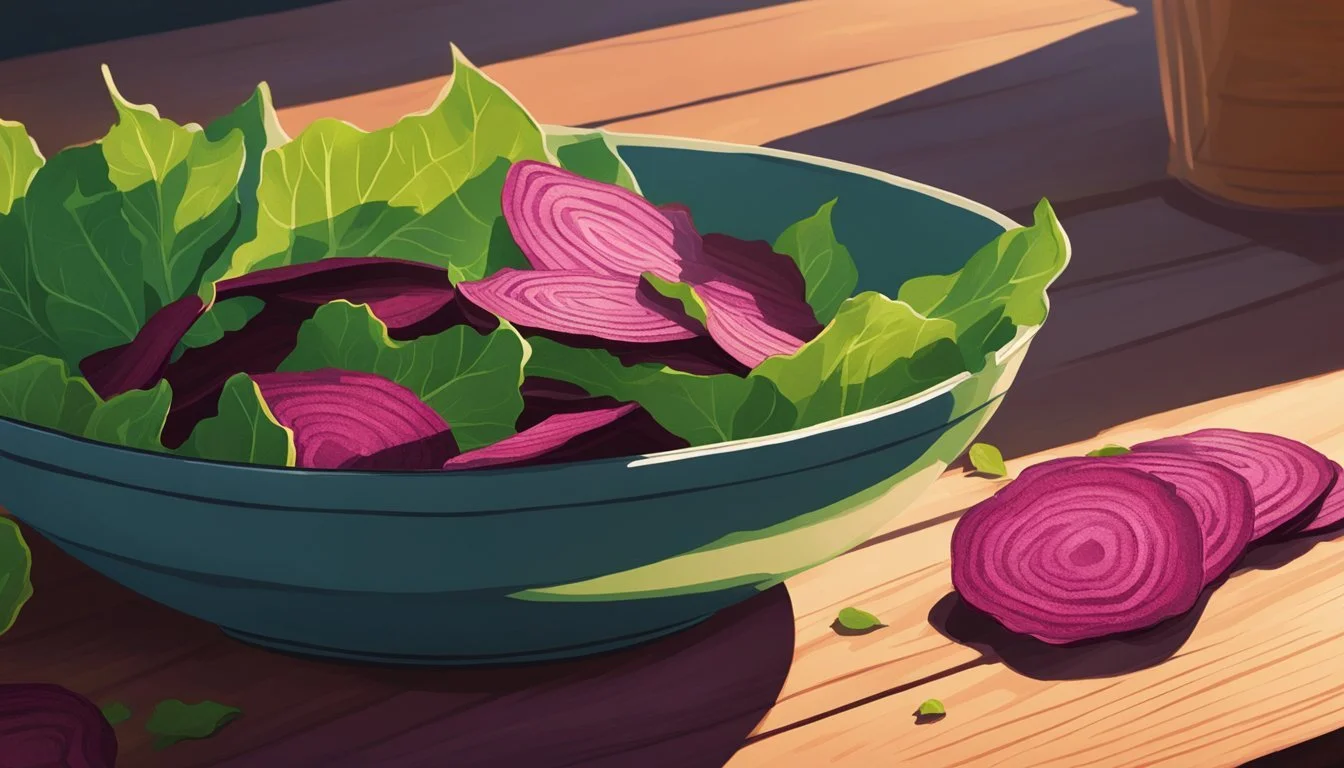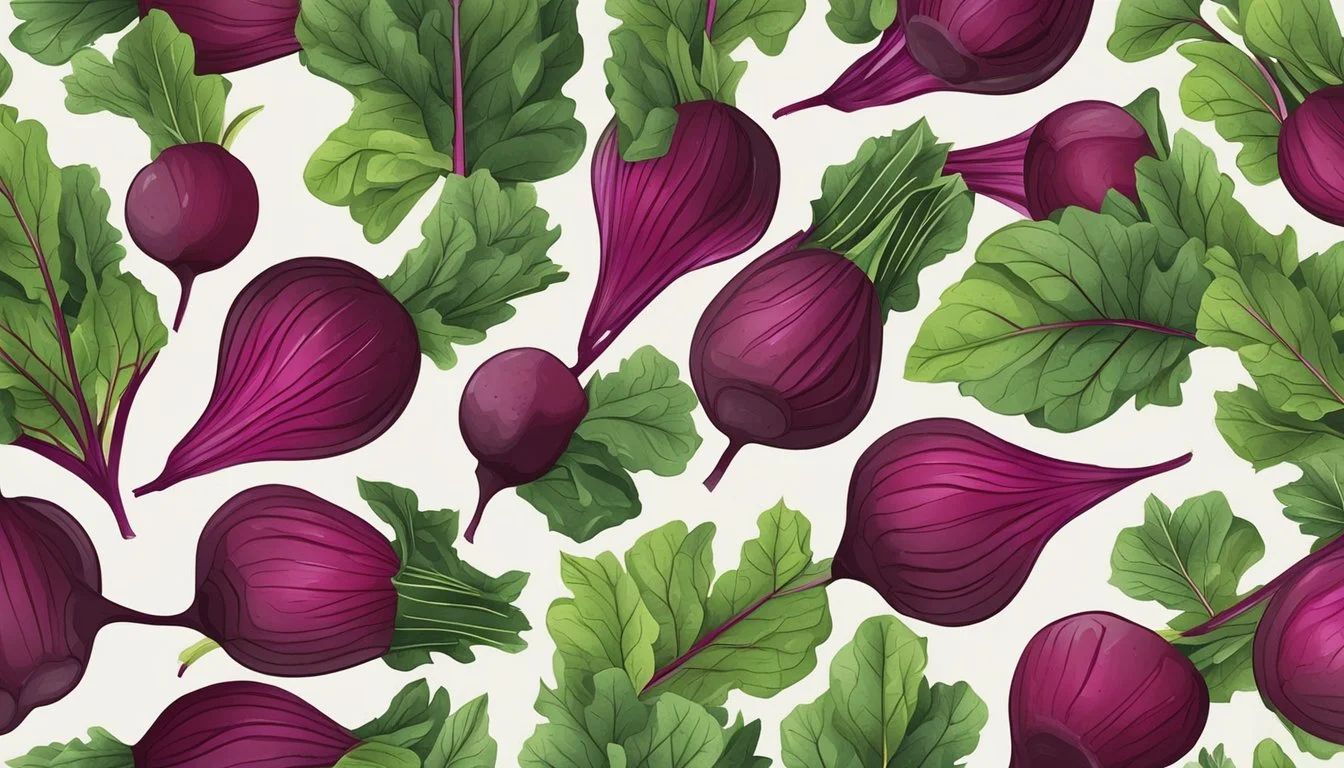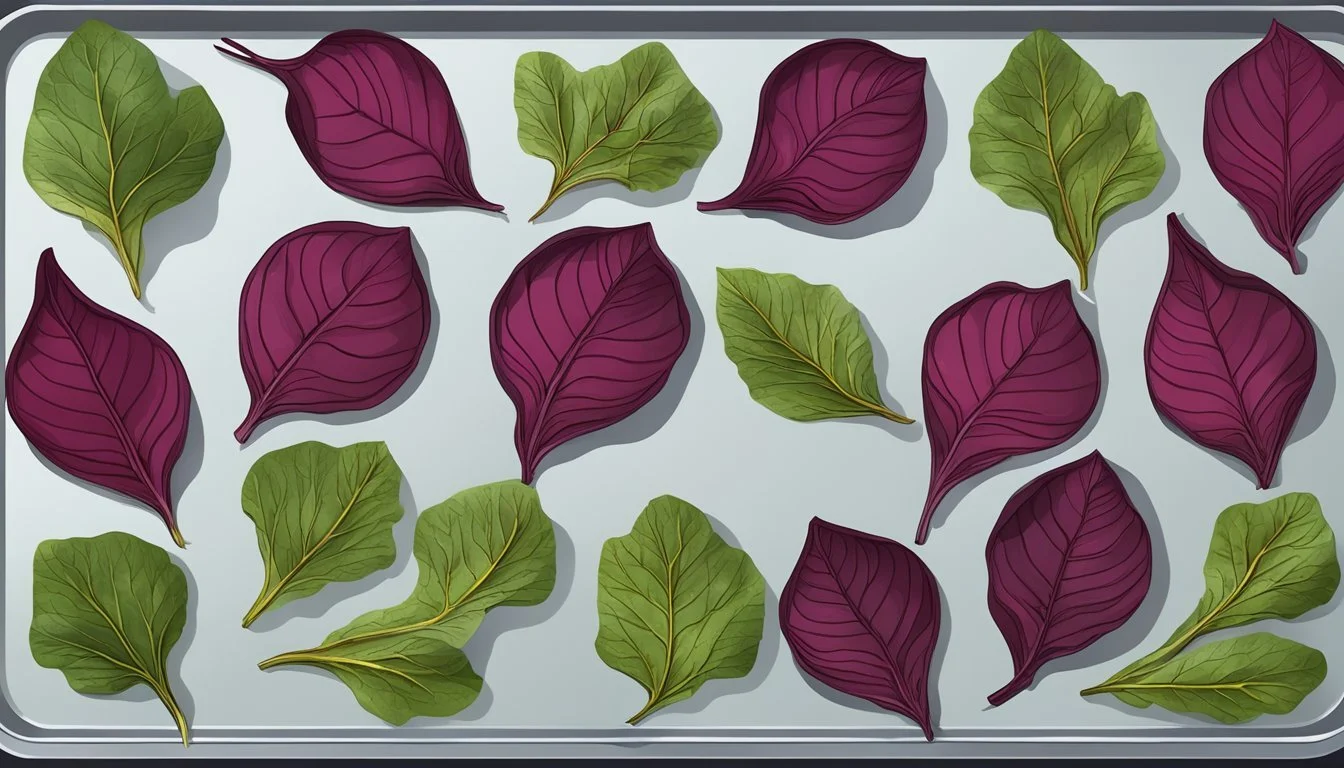Beet Leaf Chips
The Nutritious Twist on Snacking You Need to Try
Beet leaf chips emerge as a culinary trend for health-conscious snackers, presenting a nutritious alternative to traditional snack options. The leaves of beets, often discarded as waste, are a rich source of antioxidants and can be transformed into a delightful, crispy treat. Using simple baking techniques, these greens are converted into chips that offer a satisfying crunch, as well as a host of health benefits. Low in calories and high in fiber, beet leaf chips contribute to a balanced diet, while providing a unique way to reduce food waste.
The process for creating these antioxidant-packed snacks (What wine goes well with snacks?) begins with the careful preparation of fresh beet leaves—washing and drying them thoroughly. Once they are prepped, the leaves are lightly coated with a minimal amount of oil and seasonings, ensuring each chip is evenly flavored. The beet leaves are then baked at a low to medium temperature until they reach a perfect crispness. Through this method, the natural nutrients are retained, and the chips gain their characteristic crunch.
This snack is not only a wise choice for its health-promoting properties, but also for its environmental impact. By utilizing the often overlooked beet leaves, snack enthusiasts tap into a sustainable approach to snacking that minimizes waste and maximizes nutritional gain. Each bite of a beet leaf chip is an opportunity to enjoy something truly unique and beneficial for both one's health and the planet.
What Are Beet Leaf Chips?
Beet leaf chips are a crispy snack made from the often-overlooked greens of the beet plant. These chips offer a nutritious alternative to traditional snacking options, harnessing the natural antioxidant richness of beet leaves.
Origins of Beet Leaves as a Snack
Historically, beet leaves, the verdant tops of the beetroot plant, have served culinary purposes similar to other greens like spinach or chard. They are consumed in various cultures around the world, particularly where waste reduction in food preparation is emphasized. Transforming these leaves into chips is a contemporary take on utilizing the whole plant, transforming the leaves into a convenient and tasty snack.
Nutritional Profile of Beet Leaves
The nutritional value of beet leaves is impressive, as they are rich in antioxidants, vitamins, and minerals. Here's a breakdown of their primary nutritional components:
Fiber: Beet leaves are a good source of dietary fiber, which is crucial for digestive health.
Vitamins: They are particularly high in vitamin A, vitamin C, and vitamin K, which are essential for immune function, blood clotting, and maintaining good vision.
Minerals: Beet leaves offer minerals such as potassium, which benefits heart health, and magnesium, important for muscle function.
Antioxidants: Like the beetroot, their leaves are loaded with antioxidants, compounds that protect cells from damage.
Together, these attributes make beet leaf chips a smart choice for a nutrient-dense snack that supports overall health.
Health Benefits of Beet Leaf Chips
Beet leaf chips offer a nutrient-dense snacking option that not only pleases the palate with its crisp texture but also confers a variety of health benefits. These chips are rich in antioxidants and essential vitamins that contribute positively to cardiovascular health, blood circulation, and the body's natural defense mechanisms.
Supporting Heart Health
Beet leaves are a good source of fiber and potassium, nutrients essential for maintaining heart health. Fiber helps in reducing cholesterol levels which can in turn decrease the risk of heart disease. Potassium aids in regulating heartbeat and also relaxes blood vessels, contributing to better blood flow and reduced blood pressure.
Improving Blood Flow and Pressure
The dietary nitrates found in beet leaves can be converted into nitric oxide within the body. This compound helps in dilating blood vessels thus improving blood flow. Consistent consumption of these leafy chips may lead to lower blood pressure, as the body is better able to circulate blood efficiently, reducing the strain on the cardiovascular system.
Enhancing Skin and Immune Function
Beet leaves contain high levels of Vitamin C, an essential antioxidant that plays a crucial role in collagen synthesis and skin health. This vitamin also supports the immune system by enhancing its ability to ward off infections. Additionally, the anti-inflammatory properties of beet leaves may help in reducing inflammation, further bolstering skin health and immune function.
Preparing and Cooking Beet Leaf Chips
The journey to making beet leaf chips starts with careful preparation, ensuring the leaves are clean and dry. The cooking process requires attention to create a crispy, vegan snack ready in about 30 minutes.
Step-by-Step Preparation
Wash the Beet Leaves: She begins by meticulously washing the leaves to remove any dirt or debris, ensuring they are clean for consumption.
Dry the Leaves Thoroughly: The cook pats the leaves dry with a towel or utilizes a salad spinner to remove excess moisture. Leaves should be completely dry to ensure crispiness.
Preheat the Oven: They set the oven to 400° F (200° C) to preheat, which is crucial for a consistent cooking environment.
Prep the Leaves: The chef then tears large leaves into bite-size pieces, removing any thick stems that can affect the chips' texture.
Oil and Season: They evenly coat the leaves with approximately 2 teaspoons of olive oil. For added flavor, one can sprinkle salt and desired seasonings onto the leaves.
Tips for Perfect Crispiness
Even Layering: The cook spreads the leaves in a single, even layer on a lined baking tray, preventing overlap to promote uniform cooking.
Keep an Eye on the Oven: One must keep vigilant, especially during the last minutes of baking, as beet leaves can quickly transition from crisp to overdone.
Cooling: After removing from the oven, it's important to let the beet chips cool on the tray; this helps them obtain their ultimate satisfying crunch.
By following these concise steps and tips, one can create a batch of smooth, nutrient-packed beet leaf chips that are both delectable and vegan-friendly.
Creative Flavor Combinations
The versatility of beet leaf chips allows them to be enhanced with a range of dips and toppings, or by incorporating various nuts and seeds. These additions not only elevate the taste but also contribute additional nutrients, making them a delightfully complex snack option.
Pairing with Dips and Toppings
Beet leaf chips pair exceptionally well with a range of dips and toppings. For a creamy and smooth texture, hummus serves as an ideal accompaniment, complementing the chips' earthiness. Those seeking a hint of sweetness can opt for a sweet yogurt-based dip, which enhances the natural sugars in the beet leaves. On the other hand, a sprinkle of coconut flakes can add a subtle tropical flair and a contrasting texture. For a bit of tang, condiments like a balsamic reduction can introduce a tart complexity to the chip's flavor profile.
Dips:
Sweet Yogurt Dip
Savory Balsamic Reduction
Toppings:
Toasted Coconut Flakes
Incorporating Nuts and Seeds
Nuts and seeds offer a robust complement to the naturally earthy flavor of beet leaf chips. Chopped walnuts or pistachios add a satisfying crunch and richness in flavor. Meanwhile, seeds such as sesame or pumpkin seeds introduce a nutty taste and an extra layer of texture. These additions not only enhance the taste but also increase the nutritional value of the snack, adding proteins, healthy fats, and fiber.
Nuts:
Chopped Walnuts
Crushed Pistachios
Seeds:
Sesame Seeds
Pumpkin Seeds
Inclusion in Meals and Diets
Beet leaf chips can be a versatile addition to various meal plans, providing a plant-based source of dietary fiber and healthy fats, while also fitting into vegan diets due to their nutritious profile.
As a Healthy Snack Option
They offer a crispy alternative to traditional snacks and are rich in antioxidants. One can easily incorporate these chips into their diet by replacing high-calorie options with this nutrient-packed choice. The chips can be enjoyed on their own or paired with a protein-rich dip to balance macronutrients.
Integrating into Breakfast and Brunch
Beet leaf chips can add a unique twist to breakfast or brunch (What wine goes well with brunch?). They can serve as a side to avocado toast, introducing a crunch factor and extra fiber. Alternatively, they can be crumbled over oatmeal or a breakfast bowl to add texture and nutrition.
Accompanying Salads and Main Courses
These chips can elevate salads by providing a satisfying crunch, effectively replacing croutons for those seeking gluten-free or lower-carb options. For main courses, they can act as a side dish complementing proteins like grilled chicken or tofu, contributing beneficial fats and fiber to the meal.
Recipes and Variations
The delight of making beet leaf chips lies in their simplicity and the range of variations one can explore. Starting with a basic recipe, cooks can indulge in creativity, incorporating diverse flavors to tailor the snack to their taste.
Simple Beet Leaf Chips Recipe
Ingredients:
Beet leaves, thoroughly washed and dried
2 teaspoons olive oil
Salt, to taste
Instructions:
Preheat the oven to 400° F (200° C).
In a medium bowl, toss the beet leaves with olive oil until evenly coated, then lightly sprinkle with salt.
Lay the leaves flat on a baking sheet lined with parchment paper, avoiding overlap.
Bake for 10-12 minutes or until crisp, watching carefully to prevent burning.
Total time: 15-20 minutes
Servings: 2-4
Cuisine: Snack
Innovative Twists on Classic Prep
Spiced Beet Leaf Chips:
Adding a dash of cumin or garlic powder imparts a warm, earthy flavor to the chips.
Sweet and Savory Chips:
A sprinkle of brown sugar and a pinch of sea salt can create a tantalizing sweet and savory profile.
To push the boundaries, cooks might draw inspiration from other recipes such as curried beet soup by infusing curry spices into the oil coating. While beet leaves transform into chips, the root itself can be used in vibrant recipes like a mango beet smoothie or a red velvet cake smoothie, maximizing the use of this nutritious vegetable. The variations show not only flexibility in flavors but also a dedication to using every part of the beet in delicious ways.
Nutritional Considerations
Beet leaf chips offer a wealth of nutrients beneficial for health, with a nutrient profile rich in vitamins, minerals, and bioactive compounds. They serve as a healthful alternative to traditional snack options.
Macro and Micronutrient Breakdown
Beet greens are low in calories and fat, making them a suitable snack for those managing their weight. They are a good source of protein for a plant-based food, which is crucial for muscle repair and growth. The leaves are also rich in vitamin C, folate, and iron—essential nutrients for immune function and oxygen transport in the blood. Importantly, they contain high levels of potassium, which is vital for maintaining electrolyte balance and normal heart function.
Impact on Blood Sugar Levels and Diabetes
Beet leaf chips have a low glycemic index, which means they have a minimal impact on blood sugar levels when consumed in moderation. The fiber content in beet greens can help in slowing down glucose absorption, which is particularly beneficial for individuals with diabetes. Regular consumption of foods like beet leaf chips may assist in maintaining stable blood sugar and could contribute to the prevention of blood sugar spikes.
Suitability for Various Health Conditions
Consuming beet leaf chips can contribute to the dietary management of several health conditions. The nitrates present in beet greens can help in lowering high blood pressure and promoting cardiovascular health. Additionally, betalains, pigments found in beet greens, are known for their anti-inflammatory properties and may be linked to reduced risk of chronic diseases including heart disease. The antioxidants and nutrients in beet greens can also support cognitive function and may help in the prevention of obesity by providing a nutrient-dense, low-calorie snack alternative.








